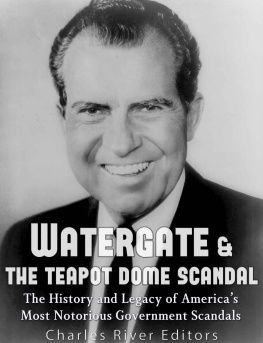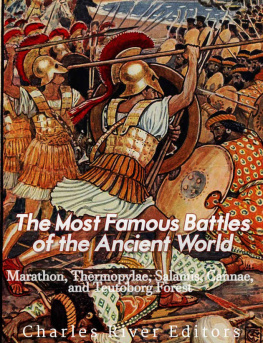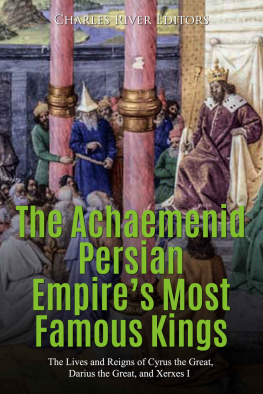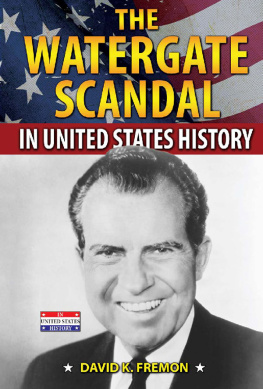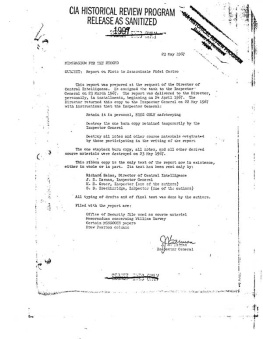Charles River Editors - Watergate & the Teapot Dome Scandal: The History and Legacy of America’s Most Notorious Government Scandals
Here you can read online Charles River Editors - Watergate & the Teapot Dome Scandal: The History and Legacy of America’s Most Notorious Government Scandals full text of the book (entire story) in english for free. Download pdf and epub, get meaning, cover and reviews about this ebook. year: 2016, publisher: Charles River Editors, genre: Romance novel. Description of the work, (preface) as well as reviews are available. Best literature library LitArk.com created for fans of good reading and offers a wide selection of genres:
Romance novel
Science fiction
Adventure
Detective
Science
History
Home and family
Prose
Art
Politics
Computer
Non-fiction
Religion
Business
Children
Humor
Choose a favorite category and find really read worthwhile books. Enjoy immersion in the world of imagination, feel the emotions of the characters or learn something new for yourself, make an fascinating discovery.
- Book:Watergate & the Teapot Dome Scandal: The History and Legacy of America’s Most Notorious Government Scandals
- Author:
- Publisher:Charles River Editors
- Genre:
- Year:2016
- Rating:5 / 5
- Favourites:Add to favourites
- Your mark:
Watergate & the Teapot Dome Scandal: The History and Legacy of America’s Most Notorious Government Scandals: summary, description and annotation
We offer to read an annotation, description, summary or preface (depends on what the author of the book "Watergate & the Teapot Dome Scandal: The History and Legacy of America’s Most Notorious Government Scandals" wrote himself). If you haven't found the necessary information about the book — write in the comments, we will try to find it.
*Includes contemporary accounts of the scandals
*Includes online resources and a bibliography for further reading
*Includes a table of contents
Increasingly and mistakenly viewed as a single scandal within the United States government, what is commonly referred to as the Watergate scandal serves as an overarching term for a series of scandals beginning in 1971 and extending through 1974, although more than any other, it refers to the specific break-in at the Watergate Hotel and office complex in Washington, D.C. The crisis, originating in a secretive battle between the two major political parties, the Nixon White Houses paranoia, and the ensuing conflict concerning the release of confidential information to the public, induced senior government officials into committing crimes (most notoriously petty burglary) and coverups for the purposes of character assassination and inter-political espionage, and it ultimately resulted in the first and only resignation of a sitting American president, Richard Milhous Nixon.
Watergate has since become so synonymous with scandal that gate is typically added to the end of words associated with scandals even today, and the Watergate complex still remains well known. In the wake of the seemingly peculiar burglary, gradual media and judicial pursuits of the thread of scandals led from one thing to another over the following years until it began to culminate with Congressional impeachment proceedings and a momentous showdown between the President and the Supreme Court over the release of presidential tapes, a moment in which Nixon seriously considered defying the Court and initiating a constitutional crisis.
For the last 40 years, President Nixon has been mostly reviled, and understandably, hes ranked among the countrys worst presidents, but this view of the President and the Watergate scandal was not and still is not necessarily unanimous.
Americans in the 21st century often cite Watergate, and to a lesser degree the Enron Oil Scandal, as prime examples of modern governmental corruption. It is a widely held perception that these incidents, particularly the one bringing about the first resignation of an American president, caused the public to lose trust in federal institutions and political figures.
However, the prototype for the breakdown of governmental fidelity lies in the early 20th century, a time in which the recent territories of the United States struggled to evolve from a lawless, Wild West culture. The federal government viewed its western resources as both unlimited and outside the grasp of the government. The leading oil barons, born and raised in the 19th century, were accustomed to federally-blessed land-grabs and easily obtained mining and lumber interests, often doled out to the social and financial elite under the guise of exploration. Federal interference was minimal in contrast to later decades, and the government itself was eager to conquer the West through large-tract farming, river management, mineral and timber development, not to mention the procurement of oil for a growing society as coal gave way to new types of fuel.
In what would become largely a jurisdictional dispute over Western natural resources, the unbridled oil industry of the new century collided with the United States military and the Department of the Interior, set against the dominance of a corruption-riddled presidential administration. In the ensuing Congressional investigation that sought to root out the widespread graft, bribery, and usurpation of government property over the following decade, the two-year affair became commonly known as the Teapot Dome Scandal. And for the first time in American history, a high-ranking cabinet official was convicted of corruption and sent to prison in the aftermath, along with his co-conspirators.
Charles River Editors: author's other books
Who wrote Watergate & the Teapot Dome Scandal: The History and Legacy of America’s Most Notorious Government Scandals? Find out the surname, the name of the author of the book and a list of all author's works by series.

